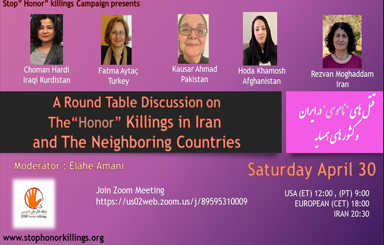From Iran to Canada: the pretext for killing women; five members of an Iranian family in Canada were victims of Arson
On Monday, September 1, 2025, a house in the Richmond Hill residential area of
Toronto (Canada) was deliberately set on fire; a home where five members of an Iranian
family lived. In this tragedy, “Rose”, an 11-year-old child, and her aunt “Helia Bahari-
Kashani”, 24, lost their lives. Three others, including “Golbarg Bahari-Kashani”, Roz’s
mother, are in intensive care fighting to survive.
According to Canadian media, the fire was intentional, and the main suspect is
Golbarg’s husband. For months, Golbarg had repeatedly informed police of her
husband’s violence and threats, yet no effective protection was provided for her or her
children. Having endured repeated threats, she had filed for divorce.
Now Golbarg, along with her father Mohammad Bahari-Kashani and her mother (name
not disclosed), are hospitalized in intensive care. In countries with democratic structures
such as Canada, the protection of women from violence should be a priority, yet this
case shows that Golbarg’s complaints and her husband’s threatening messages were
ignored by police, and no preventive measures were taken to ensure her safety.
Canadian police have labeled the incident as a “family homicide”, a misleading term
that, as in Iran, hides the reality of gender-based violence and normalizes the crime,
downplaying the responsibility of both police and the state.
Golbarg had married in Iran and later migrated with her husband to Canada. She fled a
country rife with misogynistic laws and systemic violence, only to find that in the place
that was meant to be a safe haven, a patriarchal crime turned her home into a death
trap for her and her young daughter.
According to relatives, Golbarg and Rose had sought refuge at her parents’ house in
June, telling her sisters she was forced to leave home due to her husband’s threats and
abuse. But only days later, her husband forced her and Roz to return. On a later visit to
her parents’ home, she nervously said: “We fought again, he threatened me.”
Despite these repeated complaints, Golbarg’s lawyer told Iran Wire that the police failed
to take the threats seriously. According to Maral Mirhosseini, the family’s lawyer: “For
the police to treat a threat as real and imminent, the person must provide evidence and
proof that their life is in danger.” But in reality, no one can prove before a murder that
the threats are real; one can only warn based on lived experience.
Even so, Golbarg’s husband, the main suspect, was arrested on Wednesday, but
released only a few hours later after interrogation. Police told the family there was not

enough evidence to keep him in custody. This release not only endangers the surviving
family members but also risks the destruction of crucial evidence.
This case once again reveals that the violence and killing of women is a global
phenomenon. In American and European countries like Canada, too, women, especially
migrant women, fall victim to domestic and patriarchal violence. Police and responsible
institutions, by using terms like “family dispute” to describe such crimes, evade their
responsibility to protect women. In recent years, similar cases have occurred where
perpetrators either faced no punishment or were deported after a short prison term, a
practice that, in effect, grants misogynistic criminals a pathway to impunity.
#StopHonorKillingsCampaign
#SafetyForWomen
#WomenHaveTheRightToLive
#IslamicRepublicResponsibleForWomenKillings
#NoToViolenceAgainstWomen
#Maragheh_HonorKilling
#NoToMisogynisticCulture
Follow the news in the Stop Honor Killings Campaign Telegram group:
https://t.me/stophonorkilling
Support the Stop honor Killings Campaign with Your Donations via PayPal:
https://paypal.me/stophonorkillings?country.x=US&locale.x=en_US
Stop Honor Killings Campaign


















